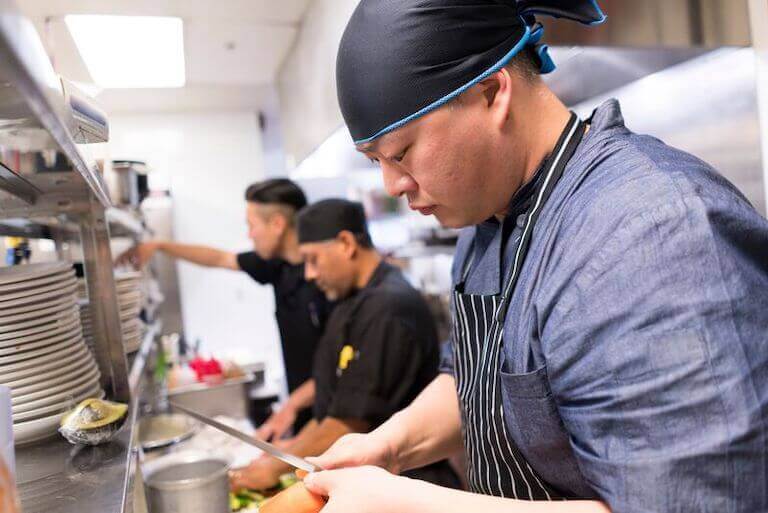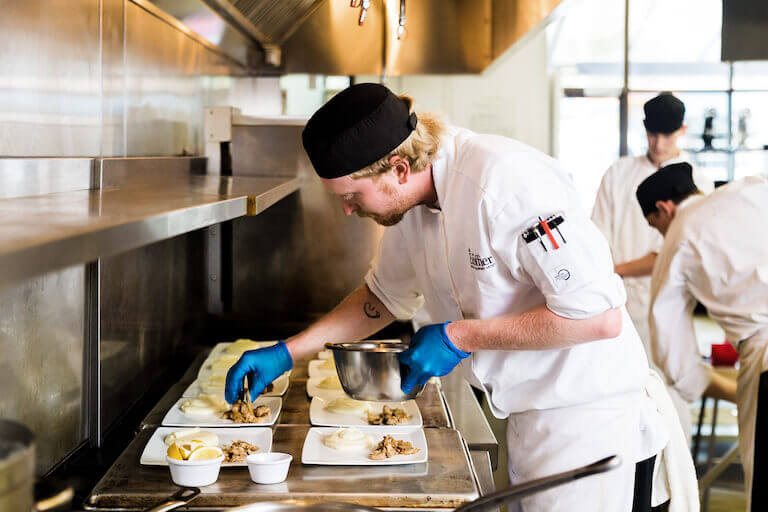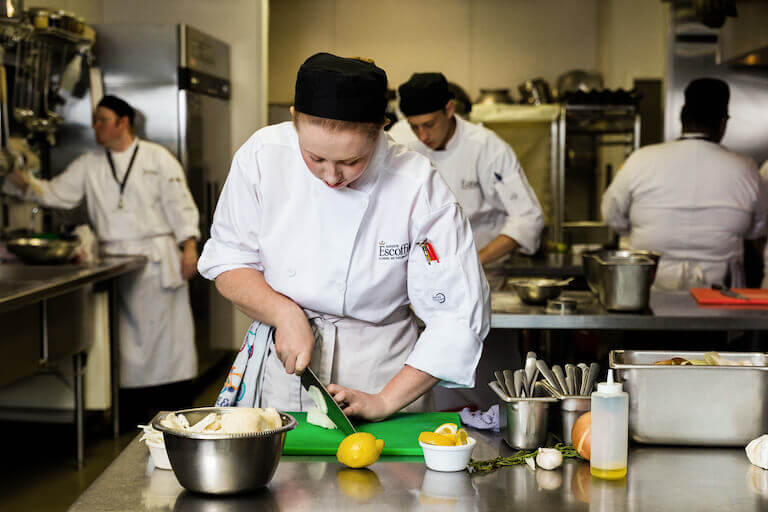Too many cooks in the kitchen? Not necessarily. When you’re working in a restaurant, everyone plays an integral role in making each meal service a success. If you’re studying at a culinary school or pursuing a career in the restaurant or hospitality industry, you’ll want to understand how every role in the kitchen contributes to the greater team.
One of the most essential roles is that of a line cook—also known as “front line” or “jack of all trades.” What exactly does it take to become a line cook? Keep on reading to explore the core skills and qualities to become successful in this role.
What Does a Line Cook Do?
A line cook is a challenging yet rewarding position that many step into towards the beginning of their culinary career, and is essential to rising up the kitchen ladder.
Most people are surprised to discover that while chefs take the bulk of the credit for the meals served in a restaurant, line cooks perform most of the actual preparation. Although a line cook is usually assigned to one station, they’re often cross-trained to jump into any station at any point, making them an essential team player as a professional cook.
The responsibilities of a line cook may vary day to day, but some of the expectations remain consistent.

A line cook is a valuable team player.
Understand Kitchen Fundamentals and Follow Directions
Line cooks are responsible for taking the menu set by the executive chef or chef de cuisine and transforming it into reality. They have to fulfill the requirements for each dish quickly, consistently, and precisely—they’re answering to the head chef, and ultimately to the customers.
A thorough mastery of foundational cooking skills like portioning meat and vegetables, preparing emulsification, or simmering grains is usually expected. Ultimately, line cooks are trained to fulfill the duties of professional chefs. Line cooks usually set up at one particular station on a given night, mixing sauces or running a grill, for example. But they have to be adaptable.
Also, depending on the night and the restaurant, line cooks may jump between stations, prepping and plating many different types of dishes, or find themselves locked into working on a single element for hours.
Culinary students may explore a vast array of foundational skills such as current cooking methods, basic cooking techniques, knife skills, food sanitation, and more—which support a variety of roles in the kitchen, including line cooks.
Work Swiftly and Efficiently
There never seems to be “enough” time in the kitchen. Customers expect their meals in a timely fashion and management tends to place strict demands on the entire service team. Line cooks should be exceptionally efficient in order to keep things operating smoothly at their stations.
As a line cook, you’re also required to come to your station with a fully-equipped tool kit and all of the ingredients required for the dishes on the menu. On top of maintaining a swift kitchen tempo, line cooks should also be well-versed in food safety to notify the kitchen of spilled food or injury.
Anyone who wants to advance to a higher position in the brigade de cuisine will likely have to demonstrate an ability to handle all the demands while remaining in constant motion and simultaneously cooking to a high standard.

An Escoffier culinary student works at his station.
What Does It Take to Be a Line Cook?
To become a line cook, there might be a specific skillset a manager may expect before hiring you for the job!
Soft Skills
To rise in the ranks within the culinary industry, there are certain “soft skills” that might specifically support your growth as a line cook.
- Great Communication: An efficient line cook can move quickly and with purpose while communicating well with others on the line. The rest of the kitchen staff needs to know how your preparation is progressing to effectively time their own tasks.
- Organization: If you’re the type of person who likes to keep a planner or prefers to maintain a running task list, then you may excel at becoming a line cook. A line cook is almost like a juggler—keeping track of several moving parts of the kitchen, without dropping the ball.
- Empathy: Ultimately a line cook should be a team player and leader—interacting with the entire kitchen staff and a range of personalities. Because of this, you might need to handle certain scenarios (sometimes conflict) with empathy to ultimately ensure everyone is working in unison.
- Curiosity: An excellent line cook will exude an intrinsic curiosity to soak up as much knowledge as possible. This includes understanding each position and their duties in the kitchen, as well as keeping up to date with cooking methods and techniques.
Hard Skills
Along with these soft skills, there’s an expectation to be equipped with the proper technical skills to excel as a line cook.
- Food Safety: As a line cook, you might need to be well-versed in maintaining cleanliness in food preparation areas, as well as cooking menu items in accordance with food safety standards.
- Kitchen Equipment Knowledge: To be a successful line cook, you’ll want to understand how to maneuver a range of cooking equipment and how to perform basic maintenance.
- Knife Skills: Along with basic cooking techniques, understanding knife skills and having the ability to execute a suite of knife cuts is critical—especially if you’re working at specific stations (ie: fry, grill, or saute.)
- Menu Development: You might be asked to provide your opinion around dishes on the menu or daily specials—which is a critical skill to refine as you rise in the ranks as a professional cook.
- Quality Control: One of the main duties of a line cook is to assure dishes are up to par with the restaurant’s standard. This might be a direct reflection of your attention to detail.
The Line Cook Career Path
A line cook is an integral stepping stone to becoming a higher-level chef—requiring grit and tenacity. Often, line cooks start by working longer hours at a lower level of pay…and entry-level restaurant jobs rarely include benefits or vacation time.
Typically, once a line cook demonstrates that they can perform the essential line cook duties at each station, they may advance in the kitchen hierarchy to become a sous chef—a position that is 100% focused on professional cooking. This position also translates to “second in command” under the head chef. They are involved in the day-to-day operations of the kitchen and can swiftly fill in when the head chef is off for the day.
Yes, it might take hard work to reach greater levels of prestige and earn a higher income, but there are ways to land a job as a line cook quickly, and then use it as a springboard to rise in the ranks as a higher-level chef.

Knife skills are an important part of the Escoffier Culinary Arts curriculum.
Begin Your Professional Cooking Career with Culinary School
If you desire to use a line cook position as a stepping stone in your career, culinary school could be the ideal route to take to fine-tune your techniques and gain a well-rounded skillset.
Applying to any line cook job with an accredited culinary school education can catch the attention of restaurant managers and may also put you in line for faster promotions.
An online culinary arts degree or diploma can help prepare you with the knowledge you may need to excel as a line cook. Plus, culinary arts students complete a hands-on externship shadowing industry professionals and can be exposed to career mentorship by professional Chef Instructors.
Enjoyed this article? Here are three more you might like:
- What Chefs Look For When Hiring Culinary School Graduates
- How to Become a Chef: The Complete Guide
- Are the Culinary Arts A Good Career Choice for You?
This article was originally published on December 4, 2015, and has since been updated.
*Information may not reflect every student’s experience. Results and outcomes may be based on several factors, such as geographical region or previous experience.



